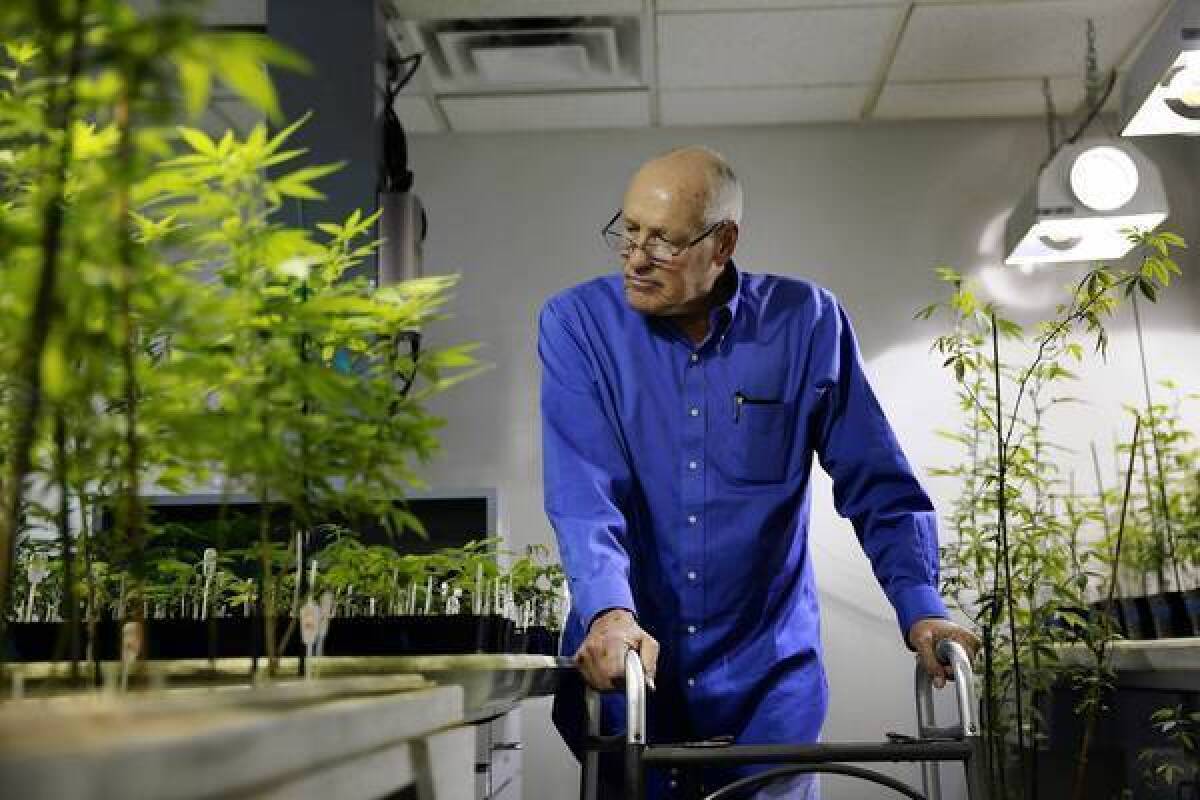Here’s why medical pot isn’t going away

- Share via
Bill Rosendahl lifts his walker over the threshold and carries it into the grow room before anyone in his entourage — press secretary, pot shop owner, pot consultant and bud tender — can rush over to help.
Even after 13 hits of radiation and seven rounds of combination chemo, Rosendahl moves steadily, straight as a poplar, past 2-foot-high cannabis plants labeled Hindu Skunk and Humboldt O.G. And, he says, Herbalcure, the Westside pot dispensary we’re touring, is responsible for his vigor.
This is what decades of battles over marijuana use have come to in L.A.: A city councilman taking a journalist around to show where he scores his dope.
Rosendahl doesn’t find it as incongruous as I do: After the Westside councilman was diagnosed with cancer, Herbalcure and The Farmacy, a Venice dispensary, developed a weed regimen for him that he says wiped out the pain that once had him writhing in bed, incapacitated.
“The brain is back, the energy is back,” he said. “Life is now worth living.”
One of the weird things about the hazy half-world where medical marijuana lives — and the one least mentioned — is how patients go about getting the right medicine. There are no sanctioned drug trials funded by Big Pharma or diagnostic manuals to tell you which of the dozens of strains with crazy names works best with your condition. Or the best delivery method. It’s all trial and error.
There’s also nothing to say how your pot is grown or to help you guard against mold and toxic pesticides. And in the wild thicket of L.A.’s 600-plus pot shops, how do you avoid sleazy dumps run by shady characters? This is a particularly delicate matter for an elected official, for whom simply appearing in the wrong pot shop, even with a physician’s prescription, could be a scandal.
Rosendahl came to the shop to make sure his dope was clean. Herbalcure passed his inspection.
“Send me a bill,” Rosendahl called as he pushed his walker down the red carpet leading out of the shop.
Rosendahl, 67, found out in July he had a rare form of cancer in the tubes between his kidney and his bladder. He was desperately ill — “more on the other side than this one,” he said. At one point, a doctor told him to skip the chemo and prepare to die.
“I said not if I can help it, and the good Lord can help me,” he said.
The cancer spread to the lumbar vertebrae in his lower back, bringing excruciating pain. Even the heaviest prescription painkillers, like OxyContin, brought only momentary relief, he said.
Before his diagnosis, Rosendahl had a pot card he had used for a decade for cannabis to treat neuropathy, a stinging pain in his foot that’s a side effect of his diabetes. Now he needed some real dope. But the city had recently moved to ban pot shops.
In October, Rosendahl used his own story to get the City Council to repeal the ban.
“I got up and said, ‘Look at me,’ ” Rosendahl recalled. “I’d be dead. You want to kill me? Throw me under the bus?’ It became very personal.”
After the speech, Herbalcure and The Farmacy came forward to offer their services. Nathan Donahoe, Herbalcure’s jack-of-all-trades, began visiting Rosendahl’s Mar Vista house weekly to discuss his condition.
Eventually, he cooked cannabis leaves in butter, creating an edible paste that Rosendahl describes as “incredible.” From the Farmacy, Rosendahl got a vaporizer called the Volcano. The combination got him back on his feet and able to resume much of his council schedule.
At his home, Rosendahl showed me his medical stash. Under eggs his backyard hens had laid, three glass mason jars filled with the viscous butter in various shades of green were lined up on the refrigerator door. The labels read “extra strength” and “1/4 teaspoon,” the dosage.
Rosendahl can cook with the butter, spread it on toast or take it straight. Donahoe said he often stops at the farmers market to pick up a loaf of organic bread so Rosendahl can slather it on.
“It tastes like a very herbal butter,” Donahoe said.
In a wooden nook in Rosendahl’s dining area sits the Volcano. The squat stainless steel appliance resembles an old-fashioned humidifier.
Rosendahl demonstrated how to load the marijuana leaves in a little metal cap, then screw it in and flip on the electric element. When the temperature reaches 350 degrees, a plastic balloon on top fills with an almost smokeless pot haze that Rosendahl inhales. A filter keeps him from developing a smoker’s cough, Rosendahl said.
“This afternoon I’ll do the butter and the Volcano, sit in the Jacuzzi, then get a massage,” he said. His doctor, he said, is delighted with his progress. He’s dropped the heavy painkillers, whose side effects were worse than anything from the dope.
Herbalcure co-owner Peter Tejera told me he had identified pot strains good for dozens of conditions, from ADD to nausea and anxiety. There is even weed to suppress appetite, which I found hard to swallow, based on my own youthful experience of the munchies.
Some of the treatments are validated by studies, but they’re not recognized by the federal government, which still outlaws marijuana. So dispensaries experiment on their own, relying on patient feedback to develop the best product.
That’s great for Rosendahl, a celebrity patient who presumably was sought out by the most reputable pot shops. But what about the run-of-the-mill non-doper, wandering around in the forest of shops without a clue where to go or what to ask for?
Chatting with Rosendahl, I kept trying to distinguish whether the pot was treating his cancer or the pain of cancer. I realized it was the wrong question. The pain robbed him of sleep and kept him on his back, where he developed bedsores. Now he’s sleeping through the night and rebuilding his strength.
That’s healing, he said. “Pain is a killer.”
Tejera got a little hinky when I asked whether the marijuana didn’t also get the councilman and other patients high. Of course it does.
And so what? Surely, with the threat of addiction and long-term health effects out of the way, the sick and dying deserve all the good times they can get. More to the point, medical marijuana isn’t going away. Let’s make sure it works for those who benefit from it.
Rosendahl is a tough guy with a touch of New Jersey in his voice and a house full of friends and relatives who will get him through this.
And although his term in office will soon end, the cancer patient is still a councilman: He says pot-dispensary laws are a mess for the state and feds to sort out, not the city. If the shops “play by the rules and pay their taxes, that’s what I care about,” he said.
More to Read
Sign up for Essential California
The most important California stories and recommendations in your inbox every morning.
You may occasionally receive promotional content from the Los Angeles Times.










